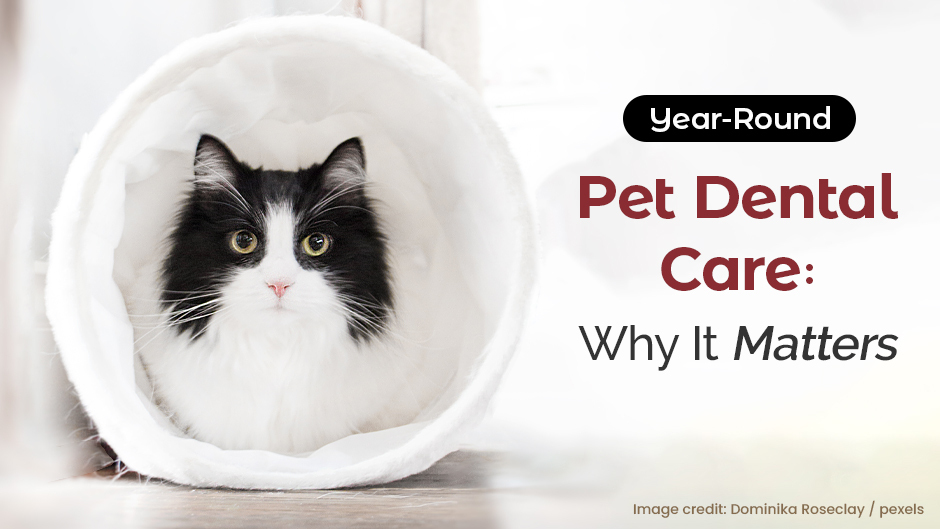February is Pet Dental Health Month and it’s a great time for pet owners to brush up on their pet care knowledge. Just like humans, pets need good dental healthcare. That’s why it’s important to understand the basics of taking care of your pet’s teeth and gums all year round. Let’s dive into the significance of proper pet dental health and how you can keep your pets healthy and happy.
Why Is Pet Dental Health Essential?
Your pet’s teeth are an essential part of their overall health and well-being. Poor dental hygiene can lead to tooth decay, infections, and other serious medical conditions such as heart disease and kidney damage. Dental decay and infections can also affect your pet’s appetite, energy levels, and overall quality of life. Therefore, taking care of your pet’s dental health should be a priority all year long, not just during Pet Dental Health Month in February.
Can you imagine eating dinner if your teeth ached or you had excruciating mouth pain? Our pets are unable to vocalize to us when they are feeling uncomfortable, so it’s crucial for us to take the necessary steps to ensure their teeth and gums are healthy.
How To Take Care Of Your Pet’s Teeth & Gums
The first step in taking care of your pet’s dental health is regular brushing with pet-specific toothpaste (never use human toothpaste). This will help remove plaque and tartar buildup from their teeth which can cause decay or gum disease. You can also ask us about supplementing brushing with oral rinses or wipes designed specifically for pets. These can help reduce bad breath and discoloration on their teeth. Finally, regular checkups at the vet are key for spotting any potential problems before they become too severe. At every routine exam, we will assess your pet’s dental health and make recommendations for your pet’s oral care as needed.
In addition to regular brushing, there are some other ways you can keep your pet’s mouth healthy. Providing them with chew toys that help scrub away some plaque buildup or giving them dental treats that are formulated to reduce tartar build-up while freshening breath naturally may be beneficial. There are a variety of options available, so you should look for ones that work best for your pet based on size, age, breed, and lifestyle. Our veterinary team can point you in the right direction for the products we recommend. Chewing on hard toys and chews, especially bones, antlers, and firm plastic bones, are common causes of major dental fractures that often lead to the need for extraction of the affected tooth. Please avoid allowing your pet to chew on any objects that you can’t indent with pressure from your fingernail as these are the objects that are likely to cause broken teeth. Alternatively, there are many products on the market that are proven to help with plaque and/or tartar reduction. Check out the lists of scientifically assessed products for cats and dogs at http://www.vohc.org/, check for VOHC approval on dental care packaging, and ask us about dental diets, which are an excellent option, especially for pets resistant to toothbrushing.
For the best dental health, getting your pet’s teeth professionally cleaned with us will help identify issues below the gumline. We can then remove or treat teeth that may present additional health issues to your pet. Dental cleanings are performed under anesthesia in pets in order to protect their airway as water is being used with the dental equipment. There is no safe & thorough way to clean a pet’s teeth without anesthesia. These cleanings are frequently needed many times during a pet’s lifetime and occasionally are warranted more than once a year (similar to how most people have their teeth cleaned twice per year). In order to spread out the time between your pet’s cleanings, daily toothbrushing at home is the best preventive measure you can implement. Please ask us if you have any questions about how dental cleanings work, and we will let you know when your pet is showing signs that they need a dental cleaning.
Signs of Oral Problems in Pets
It can be tough for owners to tell if their pets have any kind of oral problems since they can’t communicate when they’re feeling pain or discomfort in the same way that humans do. As responsible pet owners, we need to pay close attention to any changes in our pets’ behavior such as decreased appetite or difficulty chewing food—these may be signs of an underlying dental issue that needs immediate attention. Other signs include bad breath (which is common with periodontal disease) or drooling or bleeding from the mouth. Contact us immediately if you notice any of these signs in your pet.
Taking care of your pet’s dental health is essential for keeping them healthy and happy throughout the year – not just during Pet Dental Health Month in February! With these tips in mind, you’ll have one less thing to worry about when it comes to keeping your furry family member happy and healthy!

